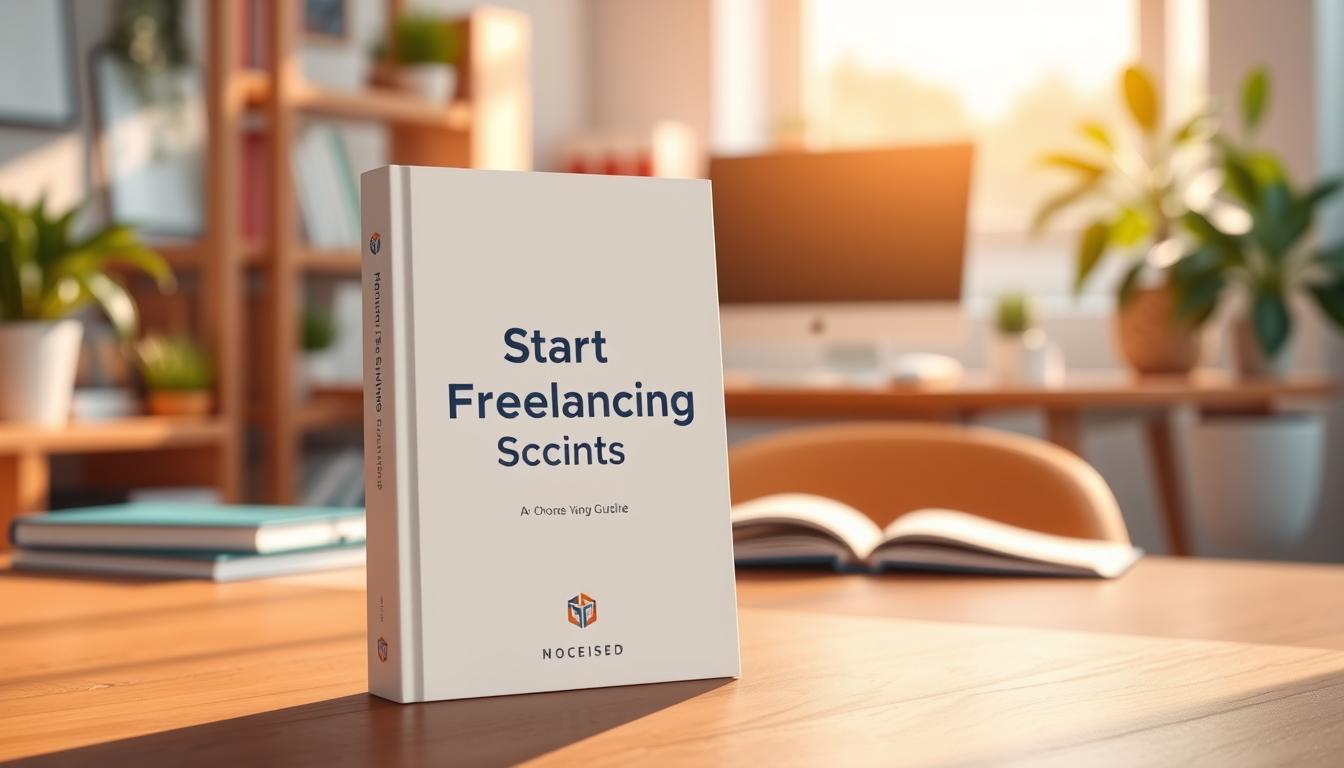When I first thought about leaving my corporate job, it was a game-changer. Many people dream of freelancing, and it’s more than just a dream. You can start freelancing, even without a lot of experience.
Freelancing offers a world of flexibility and growth. It’s perfect for recent graduates, stay-at-home parents, or anyone looking for a career change. The freelance world is open to those with unique skills and a passion for their work.
This guide will help you understand how to become a freelancer. It shows that experience is not a limit. It’s a chance to learn, grow, and build your career from the ground up.
Key Takeaways
- Freelancing is accessible to everyone, regardless of background
- No formal degree or extensive experience required to start
- Passion and willingness to learn are your greatest assets
- Multiple platforms exist for beginners to launch their freelance career
- Strategic planning can accelerate your freelance success
Understanding the Freelance Landscape in 2024

The freelance work from home revolution is changing the modern workforce. More people are finding the benefits of a flexible freelance career.
The freelance world offers great chances for independent workers in many fields. Businesses see the value in freelancers who bring special skills without long-term jobs.
Current Freelancing Statistics
- Freelancers now make up 36% of the U.S. workforce
- The global freelance market is expected to grow 15% by 2025
- Freelancers earn an average of $68,000 a year
Growing Demand for Freelancers
Companies are using more freelance talent in different areas, including:
| Industry | Freelance Demand |
|---|---|
| Technology | High |
| Digital Marketing | Very High |
| Content Creation | Rapidly Increasing |
Why People Choose Freelancing
People choose freelance work for many good reasons:
- Flexibility in work schedule
- Potential for higher income
- Diverse project experiences
- Greater work-life balance
Your freelance career lets you control your work life. You can create a career that fits your personal goals and lifestyle.
Essential Skills Assessment for New Freelancers

Starting your freelance career needs a smart plan for checking your skills. Before you begin, it’s key to know what you can do well and what you can improve. Good freelancers have a wide range of skills, not just their main job skills.
Your freelance skills set should have several important areas:
- Time Management: Being able to sort tasks and hit deadlines on time
- Communication: Talking clearly and professionally with clients
- Digital Marketing Basics
- Project Management
- Basic Financial Tracking
To start freelancing well, do a personal skill check. Find out what you’re good at and what you need to work on. Sites like Coursera, LinkedIn Learning, and Udemy are great for learning new skills.
Key skills to work on include:
- Being good at your job
- Knowing how to market yourself
- Managing client relationships
- Always learning and growing
Remember, your skills as a freelancer will change over time. The best freelancers keep learning and stay ready for new things.
Start Freelancing: Building Your Foundation
Starting a freelance career needs careful planning and preparation. When you choose to freelance, building a strong foundation is key for success. The first steps you take will shape your whole career.
Switching to freelancing requires thinking about important elements. These elements will guide your professional path. Let’s look at the main parts of a strong freelance business.
Identifying Your Niche
Finding the right niche is crucial when freelancing. Here are tips for finding your professional spot:
- Check your current skills and expertise
- Look into market demand in your field
- Think about income possibilities
- Match your passion with skills you can market
Setting Realistic Goals
Setting clear goals is important for your freelance career. Break your goals into:
- Short-term goals (3-6 months)
- Medium-term goals (6-12 months)
- Long-term career dreams
Creating a Business Plan
A detailed business plan is your guide to success. It should include:
- Financial projections
- Marketing plans
- How you’ll price your services
- Ways to get clients
Pro tip: Start building your freelance business while still working. This keeps you financially stable and reduces risk.
Building Your Online Presence
Creating a strong online presence is key for freelancers. It’s like a virtual storefront that draws in clients from different platforms. Your online image is like a billboard that shows off your skills.
To start, build a digital brand strategy. Your online image should show who you are and what you’re good at. Here are some important things to consider:
- Professional website with a clean, modern design
- Consistent branding across all digital channels
- High-quality profile photos and graphics
- Compelling professional narrative
Social media is also vital for freelancers. Choose platforms that fit your field:
| Platform | Best For | Professional Focus |
|---|---|---|
| Professional networking | B2B services, corporate connections | |
| Quick updates | Tech, writing, creative industries | |
| Visual portfolios | Design, photography, visual arts |
Your online brand should tell a compelling story about your career. Share your insights, show your work, and prove your expertise with good content. Clients want freelancers who can show their value well.
Creating a Professional Portfolio
Creating a strong portfolio is key for freelancers. It shows off your skills and draws in clients. Even without a lot of client work, you can make a portfolio that stands out.
Building a portfolio needs careful planning and creativity. Clients want to see your skills and what you can do. Show them what makes you different.
Portfolio Website Essentials
Your portfolio website should look professional and be easy to use. It should have:
- A clear, professional headshot
- A concise professional summary
- A clean, responsive design
- Easy-to-read contact information
Showcasing Work Samples
When you don’t have client projects, think outside the box:
- Create mock projects to show your skills
- Use personal projects or school work
- Make speculative designs or content
- Contribute to open-source projects
Writing Compelling Service Descriptions
Write service descriptions that clearly show your skills and value. Focus on:
- Specific results you can achieve
- Unique ways to solve problems
- Quantifiable results when you can
- Your professional attitude and work ethic
A great portfolio shows your potential. Be confident, creative, and strategic in showing what you can do from home.
Choosing the Right Freelance Platforms
Finding the right freelance platforms can be tough for new freelancers. Each platform is designed for different skills and backgrounds. Choosing the right one is key to your success.
Here are some top platforms to look at:
- Upwork: Best for professional services with diverse project types
- Fiverr: Ideal for creative and digital service offerings
- Freelancer.com: Great for technical and skilled professional work
Choosing the right platform needs careful thought. Each has its own features, fees, and markets. You want to find one that fits your skills and goals.
When picking platforms, consider these factors:
- Commission rates
- Competition level
- Project diversity
- Payment protection
Pro tip: Don’t stick to just one platform. Being on multiple platforms boosts your chances of finding work.
Make your profile stand out. Show off your skills, share your past work, and write a compelling bio. This will draw in clients.
Pricing Strategies for Beginners
Starting out as a freelancer, figuring out your pricing can be tough. Your rates affect how many clients you get and if you can make a living. It’s key to setting a good price to start your career off right.
Understanding pricing means looking at a few important things. Good freelancers know pricing is about offering value, not just setting a number.
Setting Competitive Rates
To set rates that show your worth, follow these steps:
- Look at what others in your field charge
- Think about your skills and experience
- Figure out how much you want to make each year
- Remember to include costs for running your business and taxes
Understanding Market Values
Prices vary across different freelance jobs. Do your homework to see what clients are willing to pay. Use sites like Glassdoor, PayScale, and freelance platforms to learn more.
Creating Pricing Packages
Offer different packages to fit various budgets and needs. You might want to have:
- Basic package: Simple services
- Standard package: More detailed services
- Premium package: Top services with extra help
Your prices should show your skills and the value you offer. As you get more experience and a solid portfolio, you can raise your rates.
Marketing Yourself as a New Freelancer
Starting your freelance career means more than just looking for jobs. You need to build a strong personal brand. This brand should draw in clients and show off your special skills.
Use many channels to get your freelance work seen. A good strategy shows off your skills and makes you stand out.
- Build a professional online presence across social media platforms
- Create targeted content demonstrating your industry knowledge
- Network with potential clients and industry professionals
- Develop a compelling personal brand narrative
Sites like LinkedIn and Twitter are great for marketing yourself. Share your insights, show off your work, and talk to potential clients. Your profile should clearly show what you offer.
| Marketing Channel | Potential Impact | Effort Required |
|---|---|---|
| High professional networking | Medium | |
| Personal Blog | Demonstrate expertise | High |
| Visual portfolio showcase | Low |
Building a solid marketing plan takes time. Consistency is crucial in getting freelance jobs and building your reputation. Focus on quality and keep improving your skills to shine in the freelance world.
Managing Client Relationships
When you start freelancing, learning how to manage client relationships is key. Good communication and setting clear boundaries are essential. They can turn your freelance work into a successful career.
Being a successful freelancer is more than just doing great work. It’s about building trust, setting clear expectations, and keeping professional interactions strong. This way, clients will want to work with you again.
Communication Best Practices
- Respond to client messages within 24 hours
- Use clear, concise language
- Confirm project details in writing
- Provide regular project updates
Setting Professional Boundaries
Setting boundaries is important for your well-being as a freelancer. Define your working hours, how you communicate, and what projects you take on. This helps avoid burnout.
| Boundary Type | Recommended Practice |
|---|---|
| Communication Hours | 9 AM – 5 PM, Monday-Friday |
| Response Time | Within 24 business hours |
| Revision Limits | 2 free revisions per project |
Delivering Quality Work
Your reputation as a freelancer depends on delivering top-notch work. Always aim to exceed what clients expect by:
- Understanding project requirements well
- Meeting deadlines every time
- Addressing any issues early
- Looking for feedback to improve
By following these tips, you’ll build a strong reputation. You’ll also create lasting relationships with your clients in your freelance journey.
Financial Management for Freelancers
Managing your finances as a freelancer is all about planning and discipline. Your income can change a lot, so it’s key to build strong financial habits. These habits help keep your money safe.
It’s important to track where your money comes from. This helps you stay on top of your finances. Here are some tips for managing your money well:
- Keep your personal and business money separate
- Use software to track your expenses
- Save 25-30% for taxes
- Have an emergency fund for 3-6 months of living costs
Budgeting is crucial when you don’t get paid the same every month. Make a flexible budget that can handle changes in income. Here are some tips for budgeting:
| Budget Category | Recommended Allocation |
|---|---|
| Essential Expenses | 50-60% |
| Savings | 20-30% |
| Professional Development | 10-15% |
Don’t forget about saving for retirement. Look into options like Solo 401(k) or SEP IRA. Also, think about getting professional liability insurance and health insurance for your future.
Using digital tools can make managing your money easier. Apps like QuickBooks, FreshBooks, and Wave help with invoices, tracking expenses, and reports. They give you a clear view of your income.
Conclusion
Starting freelancing without experience might seem tough, but you have endless potential. The journey to finding freelance jobs starts with knowing your skills, creating a strong online presence, and always learning. Your hard work and smart planning can turn your freelance dreams into a real career.
Remember, every pro started where you are now. Stay flexible, keep going, and keep improving your skills. Sites like Upwork, Fiverr, and LinkedIn are great for newbies who are willing to learn and network.
Freelancing requires patience and toughness. Work on making a great portfolio, know what clients want, and give them the best service. Keep growing by taking online classes, going to webinars, and keeping up with trends in your field.
Freelancing offers great freedom and chances for those brave enough to take risks. By using the tips from this guide, you can build a successful freelance career. This career will not only make you financially independent but also let you do work you love. Just take that first bold step.

